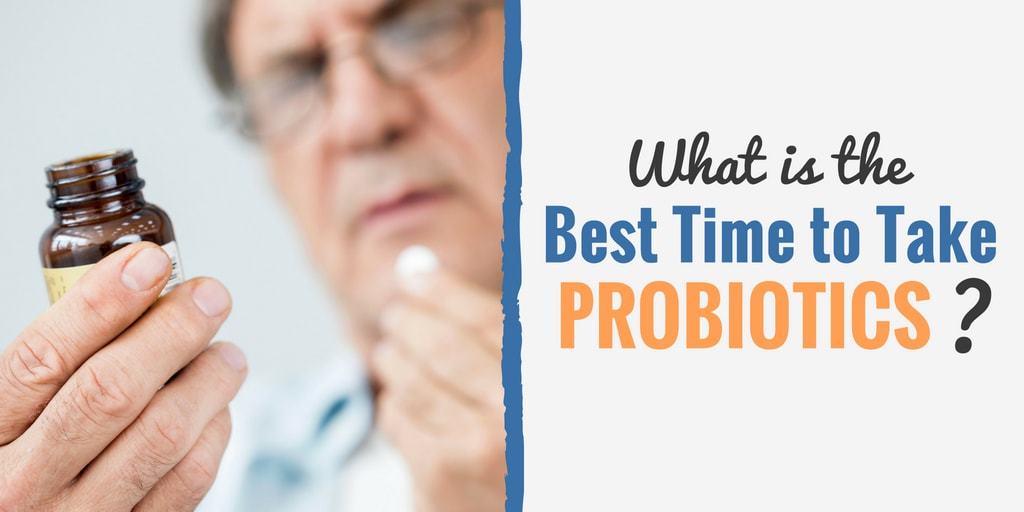It's a common issue. You've decided to start taking probiotics, but you keep reading conflicting information regarding the best time to take them.
It can be confusing to figure out what is the best time to take probiotics, and the reason is simple: Different brands give different instructions, so you’re never sure which piece of information you should pay attention to.
Taking probiotics at any time of the day is better than not taking them at all, but taking them at the right time can optimize their potential health benefits.
To answer the question of what is the best time to take probiotics, you just need to understand what situation will give the probiotic bacteria the best chance of reaching the large intestine alive.
It's important to remember that probiotics are more effective in the lower portion of the gastrointestinal tract.

This means they have to survive the harsh acids in the stomach first before they are able to really benefit your body. The stomach was designed to begin the digestive process and to fight off and destroy bacteria that you ingest with food, so it is critical to protect the probiotic bacteria while it passes through your stomach.
In this article, we’ll provide a quick action plan for determining the best time to take your probiotics.
What Is the Best Time to Take Probiotics?
It is true that you can get enough probiotics from your diet, but sometimes you need a bit of a boost. Some specific times that this may be true are when you are traveling or after taking a course of antibiotics. During these times, it is helpful to take a probiotic supplement.
Picking a time to take your probiotics depends on two factors:
1. Your reason for taking probiotics.
If you are taking these supplements because of digestive issues like diarrhea or bloating, you will benefit the most from taking them with each meal or directly after. The dietary fat in the food you consume will help the healthy bacteria in probiotics survive through your intestinal tract.
For those who have trouble sleeping, it is best to take probiotics right before getting into bed because there is a strong connection between the gut and liver, and calming the liver tends to help with sleep.
Research has proven this connection through studies of people with cirrhosis of the liver and other liver diseases. Studies have shown that these individuals suffer from insomnia more than those with healthy livers.
Some people take probiotics to maintain the health of their mouths and sinus cavities because probiotics help reduce destructive bacteria from occupying the teeth, mouth, and gums. In this case, it is best to probiotics before bedtime.
2. Your personal circadian rhythm.
Because your gut bacteria can influence your sleep cycle, it is common to take probiotics to help heal an unhealthy digestive tract. Having a bacteria imbalance in the gut can reduce your quantity and quality of sleep. But having a healthy gut can improve sleep.
If you are an early riser, take your probiotics in the morning. If you tend to stay up late at night, take them in the evening.
Three General Rules for Taking Probiotics
1. Be consistent in eating foods with probiotics.
It is great if you can get your probiotics from natural sources of food, such as kimchi and yogurt. Remember that the most popular foods containing probiotics have been around for a long time (in their countries of origin like Japan), and people involved in studies that report benefits have been eating them for the majority of their lives.
Probiotic supplements provide a great boost, but you can never be sure exactly which strains of bacteria your body can benefit from the most. If you eat a diverse diet with a lot of different probiotic foods, you will be giving your body the wide variety of healthy bacteria that it needs.

2. Get a probiotic with prebiotics.
Prebiotics don’t contain bacteria as probiotics do. Instead, they simply serve as food for probiotics. They provide the necessary fuel to help bacteria grow, and probiotics are living microorganisms that need this sustenance in order to function.
When used in conjunction, prebiotics and probiotics are referred to as synbiotics. Synbiotics are especially healthy because probiotics may have a hard time surviving when they are trying to pass through the intestinal tract. This means that they often don't actually make it all the way to the lower intestines (which is where they need to be in order to give you health benefits).
The idea behind synbiotics is that using pre- and probiotics together can increase the chances that the healthy bacteria will get to your gut alive and well. Synbiotics are noted to be especially useful for those suffering from conditions such as IBS and diabetes.

3. If you’re taking probiotic supplements for health maintenance, take probiotics at the end of a meal.
Doing this will help protect the bacteria from stomach acids and ensure they maintain their potency. If you take probiotics on an empty stomach, the acid in your stomach may overcome the enteric coating of the capsule and kill the delicate strains of bacteria, rendering the supplement useless.
By taking your probiotic after eating, you give it a buffering system and a better chance of passing through the digestive tract. Aside from just providing protection, having food in your stomach also gives your probiotic some nourishment to make sure it survives, grows, and thrives in your gut.
Conclusion
There are several factors that help determine what is the best time to take probiotics. This includes your reason for taking it and your sleep cycle. But the most important thing is consistency in eating foods with probiotics, and taking probiotic supplements that include prebiotics.
Everyone should avoid taking probiotics within a two-hour window of taking herbs, prescription drugs, or any other supplements that have anti-bacterial properties because certain foods and medications can kill probiotics. If you take any of these, just wait at least two hours before taking probiotics.
When you find the schedule that works for you, stick with it and stay on a regular routine. Hopefully, this article helped you figure out the perfect time for when you should take your probiotics.
Finally, if you want to focus on a great HEALTH habit that increases your energy and helps with your weight goals, then take 30-seconds each morning to prepare this drink to feel energized throughout the day.


